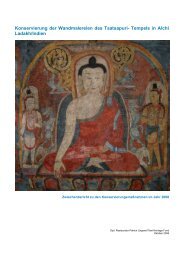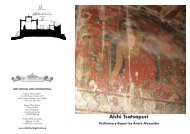Beijing Hutong Conservation Plan - Tibet Heritage Fund
Beijing Hutong Conservation Plan - Tibet Heritage Fund
Beijing Hutong Conservation Plan - Tibet Heritage Fund
Create successful ePaper yourself
Turn your PDF publications into a flip-book with our unique Google optimized e-Paper software.
d) Residents’ opinions regarding conservation and tourism<br />
d-1 <strong>Conservation</strong><br />
68% of surveyed residents were aware about the regulation adopted in 2002 that officially declared 25 historic areas in <strong>Beijing</strong> as protected, and they<br />
were further aware that their area (i.e. each of three surveyed areas) was also included. But some of them expressed their doubts of the meaning of this<br />
‘’protection’’, citing the example of Nan Chi Zi conservation area, another of the 25 protected areas, which was partly demolished in 2002.<br />
80% of the residents suggested that the <strong>Hutong</strong>s should be preserved and passed down to the coming generations as an important part of Chinese<br />
cultural heritage. So we found the majority of inhabitants being concerned about the issue of conservation.<br />
The following suggestions were collected from the residents during the survey:<br />
* Extension buildings should be removed and density within each courtyard should be regulated.<br />
* Their area’s overall environment and especially the sanitary conditions could still be further improved.<br />
* Well-preserved courtyard houses should be restored and ordinary courtyards should be reformed [i.e. rehabilitated including some reconstruction].<br />
* The <strong>Hutong</strong> lanes should be preserved in their entirety.<br />
* The green environment within the lanes should be preserved.<br />
* It is necessary to have a good overall plan in order to successfully preserve the <strong>Hutong</strong> areas.<br />
* “If there are no more <strong>Hutong</strong>s then there will be no <strong>Beijing</strong>” many said.<br />
* Maintenance and improvement of the houses should be done building by building, i.e. organized at courtyard level.<br />
* Co-operation between the government, residents and foreign investors/donors was suggested as beneficial for conservation.<br />
* Any conservation would depend on government intervention in the form of regulations and laws that should protect homes and residents.<br />
Many residents think that small-scale repairs and regular maintenance<br />
at courtyard level will be the realistic methods for preservation of the<br />
<strong>Hutong</strong>s, at the same time many thought it necessary to have strong<br />
support from the government with effective conservation laws that<br />
protect both the community and the physical structures (<strong>Hutong</strong> lane<br />
structures and individual courtyard houses). When asked to consider all<br />
the positive and negative aspects of <strong>Hutong</strong> life, and then decide<br />
whether they would agree to move under the present system, 82%<br />
would choose to stay in the <strong>Hutong</strong>s. If they would be offered what they<br />
would regard as adequate compensation and reasonably acceptable<br />
new housing, still 60% would refuse to move.<br />
Modern and Traditional life style, which would you prefer?<br />
45




